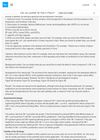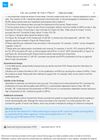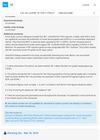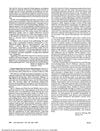 21 citations,
November 2021 in “Biomolecules”
21 citations,
November 2021 in “Biomolecules” Eclipta prostrata is a medicinal plant that helps treat diseases, protects the liver and nerves, and promotes hair growth.
[object Object]  17 citations,
May 2018 in “PeerJ”
17 citations,
May 2018 in “PeerJ” VB-1, a natural compound, may promote hair growth by enhancing a key cell growth pathway.
13 citations,
January 2023 in “Frontiers in Nutrition” Lindera aggregata has many beneficial compounds that can help prevent and manage diseases.
 9 citations,
November 2022 in “Applied sciences”
9 citations,
November 2022 in “Applied sciences” Marine algae compounds may improve skin health and promote hair growth.
8 citations,
July 2021 in “F1000Research” Plant-based compounds might be a promising alternative for prostate cancer treatment with fewer side effects.
3 citations,
February 2024 in “International journal of molecular sciences” Hesperidin from orange peels is a promising natural ingredient for skincare due to its multiple beneficial properties.
 3 citations,
August 2021 in “The Open Dermatology Journal”
3 citations,
August 2021 in “The Open Dermatology Journal” The herbal hair serum improves hair quality and growth, and is a good alternative to traditional cosmetics because it doesn't contain harmful chemicals like parabens and sulphates.
2 citations,
June 2023 in “Journal of clinical medicine” Soy supplements improve various skin conditions and aging signs, with topical use boosting skin barrier function.
[object Object] 2 citations,
August 2022 in “Animals” Essential oils may improve dogs' health and melatonin can help with their sleep and anxiety, but both should be used carefully.
 2 citations,
December 2021 in “ScienceRise”
2 citations,
December 2021 in “ScienceRise” The best way to extract oil from Urtica dioica roots is by using corn oil, a 1:5 ratio of raw material to extract, extracting for 6 hours, and using the maceration method.
1 citations,
February 2024 in “Diversity” African plants can treat hair issues and may help with diabetes.
 1 citations,
March 2022 in “Daehanhanuihakoeji”
1 citations,
March 2022 in “Daehanhanuihakoeji” Artemisia sieversiana extract may help prevent hair loss and promote hair growth.
 November 2024 in “Applied Sciences”
November 2024 in “Applied Sciences” Wild strawberry waste extract can be a sustainable cosmetic ingredient for treating acne and hair loss.
February 2024 in “IntechOpen eBooks” Proper nutrition can help manage PCOS symptoms and improve overall health.
 January 2024 in “Deleted Journal”
January 2024 in “Deleted Journal” Thuja plants have medicinal properties and potential for developing new therapies.
 January 2024 in “Journal of Ayurveda and integrative medicine”
January 2024 in “Journal of Ayurveda and integrative medicine” Millets may help reduce chemotherapy side effects like nausea, fatigue, and hair loss.

Justicia procumbens extract may help prevent hair loss and improve hair thickness and shine in a type of hair loss condition.

Nanocarriers with plant extracts show promise for safe and effective hair growth treatment.

New treatments for hair loss should target eight main causes and use specific plant compounds and peptides for better results.

Plant-based compounds can improve wound dressings and skin medication delivery.
 April 2022 in “Molecules”
April 2022 in “Molecules” Teak leaf extract contains compounds that could help treat hair loss.
October 2022 in “Our Dermatology Online” The Trust tonic is more effective than minoxidil for treating hair loss.

VB-1, a natural compound, may promote hair growth by enhancing important cell signaling and increasing key gene expression.

The natural compound VB-1, found in a Chinese herb, can promote hair growth by boosting cell activity in human skin cells.

A natural compound called VB-1 can help promote hair growth by boosting a specific cell signal in human skin cells.
 December 2022 in “한국 미생물 생명공학회지”
December 2022 in “한국 미생물 생명공학회지” TS-SCLF from fermented Schisandra chinensis may promote hair growth and improve hair quality.
 9 citations,
May 2018 in “International Journal of Current Microbiology and Applied Sciences”
9 citations,
May 2018 in “International Journal of Current Microbiology and Applied Sciences” Certain plant compounds can help treat diabetes.
 3 citations,
April 1990 in “Archives of dermatology”
3 citations,
April 1990 in “Archives of dermatology” The book reveals diverse patterns of hair growth in different species and advancements in hair and alopecia research.
 1 citations,
February 1977 in “Archives of Dermatology”
1 citations,
February 1977 in “Archives of Dermatology” Fresh plasma transfusions did not help treat Leiner disease in an infant.
 79 citations,
January 1982 in “The American Journal of Medicine”
79 citations,
January 1982 in “The American Journal of Medicine” Etoposide is effective in treating several cancers, especially small cell lung cancer, with acceptable side effects.






















